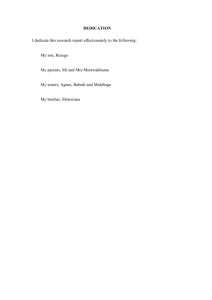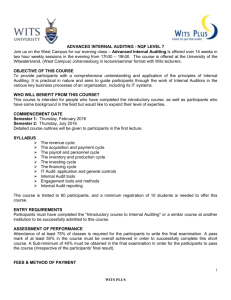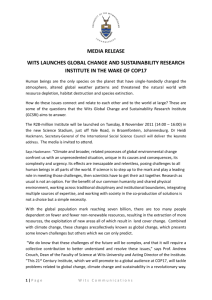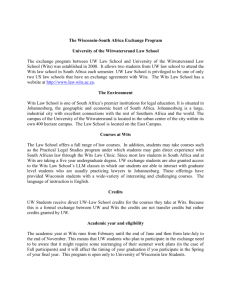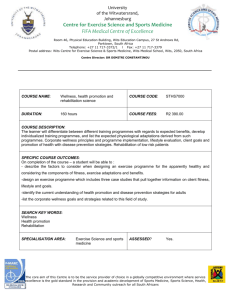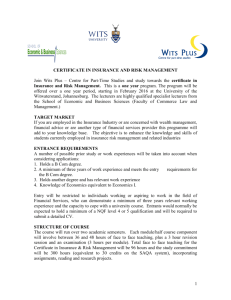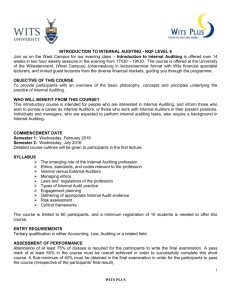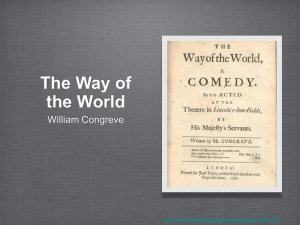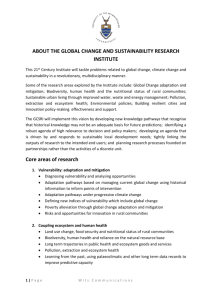Class format: Lecture, case study, discussion, team project and
advertisement
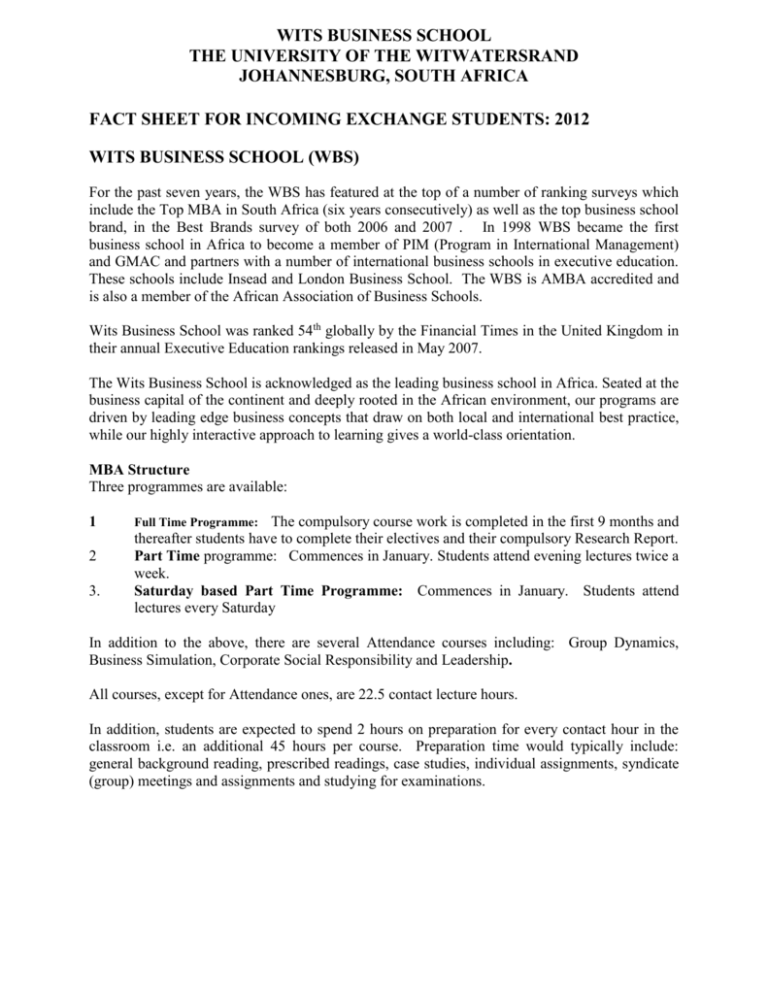
WITS BUSINESS SCHOOL THE UNIVERSITY OF THE WITWATERSRAND JOHANNESBURG, SOUTH AFRICA FACT SHEET FOR INCOMING EXCHANGE STUDENTS: 2012 WITS BUSINESS SCHOOL (WBS) For the past seven years, the WBS has featured at the top of a number of ranking surveys which include the Top MBA in South Africa (six years consecutively) as well as the top business school brand, in the Best Brands survey of both 2006 and 2007 . In 1998 WBS became the first business school in Africa to become a member of PIM (Program in International Management) and GMAC and partners with a number of international business schools in executive education. These schools include Insead and London Business School. The WBS is AMBA accredited and is also a member of the African Association of Business Schools. Wits Business School was ranked 54th globally by the Financial Times in the United Kingdom in their annual Executive Education rankings released in May 2007. The Wits Business School is acknowledged as the leading business school in Africa. Seated at the business capital of the continent and deeply rooted in the African environment, our programs are driven by leading edge business concepts that draw on both local and international best practice, while our highly interactive approach to learning gives a world-class orientation. MBA Structure Three programmes are available: 1 2 3. The compulsory course work is completed in the first 9 months and thereafter students have to complete their electives and their compulsory Research Report. Part Time programme: Commences in January. Students attend evening lectures twice a week. Saturday based Part Time Programme: Commences in January. Students attend lectures every Saturday Full Time Programme: In addition to the above, there are several Attendance courses including: Group Dynamics, Business Simulation, Corporate Social Responsibility and Leadership. All courses, except for Attendance ones, are 22.5 contact lecture hours. In addition, students are expected to spend 2 hours on preparation for every contact hour in the classroom i.e. an additional 45 hours per course. Preparation time would typically include: general background reading, prescribed readings, case studies, individual assignments, syndicate (group) meetings and assignments and studying for examinations. CONTACT INFORMATION Address: Postal Address Wits Business School P O Box 98 Wits 2050 SOUTH AFRICA Physical Address Wits Business School 2 St. David’s Place Parktown 2193 Johannesburg SOUTH AFRICA Co-ordinator: Karen Trent International Programmes Co-ordinator Telephone: Fax: Email: +27 11 717-3593 +27 11 717-3920 Karen.Trent@wits.ac.za Director International Programmes : Prof Gillian Marcelle Gillian.Marcelle@wits.ac.za Websites: http://www.wbs.ac.za (Wits Business School) http://www.wits.ac.za (University of the Witwatersrand) 2012 TERM DATES MBA (FT & PT) and PDM (FT & PT) REGISTRATION WEDNESDAY 4th JANUARY 2012 (new students) THURSDAY 5h JANUARY 2012 (returning students) FRIDAY 6thJANUARY 2012 (new & returning students) Group Dynamics 9-10 January 2012 - (MBA FT and PT) 12-13 January 2012 - PDM (FT and PT) and MM (ENVC and SM) Lectures and Examinations Monday 16 January – Friday 23 March 2012 Full time: 12 March –23 March 2012 Part time: 19 March –23 March 2012 First quarter Exam dates Second quarter Exam dates Tuesday 10 April – Friday 22 June 2012 Full time: 11 June – 22 June 2012 Part time: 17 June – 22 June 2012 Monday 02 July – Friday 07 September 2012 Full time and part time: 02-07 September 2012 Third quarter Exam dates Fourth quarter Exam dates Monday 17 September – Friday 23 November 2012 Full time: 12 November – 23 November 2012 Part time: 19 November – 23 November 2012 PDM Part-time (April intake) Registration 28 March 2012 Lectures and Examinations First quarter Exam dates Second quarter Exam dates Third quarter Exam dates Tuesday 10 April – Friday 22 June 2012 Full time: 11 June – 22 June 2012 Part time: 17 June – 22 June 2012 Monday 02 July – Friday 07 September 2012 Full time and part time: 02-07 September 2012 Monday 17 September – Friday 23 November 2012 Full time: 12 November – 23 November 2012 Part time: 19 November – 23 November 2012 MBA ELECTIVE TIMETABLE 2012 First Quarter January - March (only for 2012 students) LECTURER BUSA CODE STORYTELLING P CHRISTIE 5120 6-11 FEB AFRICAN LEADERSHIP L BOOYSEN 5103 18-24 FEB D HEIL 7006 14,21,28 FEB, 6,13,20,27 MAR, 3,10 APRIL LECTURER BUSA CODE DATES CORPORATE FINANCE A KINSEY 6000 2-7 JULY INVESTMENT ANALYTICS T MOSALA 5076 9-14 JULY FINANCIAL DERIVATIVES A KINSEY 5022 25-30 JUNE NEGOTIATIONS TBA 5115 9-12 JULY/TBC STRATEGIC MANAGEMENT DEVELOPMENT (GOLF) G SMITH 5169 16-19 JULY SOICHER 5160 8,15,22,29 AUG, 5,12,19,26 SEPT & 3 OCT SERVICE INDUSTRY MANAGEMENT S COHN 5164 13,14,18 AUG &22,23,27 OCT CUSTOMER RELATIONSHIP MANAGEMENT G BICK 5104 13,14,20,21,27,28 JULY STRATEGIC MARKETING R ABRATT 5081 23,24 JULY & 13,14 AUG 5118 31 AUG, 1 & 21 SEPT EXECUTIVE COACHING J STACEY J YUDELOWITZ 5110 23,23 & 27,28 AUG SA LEGISLATIONS FOR HUMAN CAPITAL MANAGERS M MCETHE 5119 TBC LABOUR ISSUES IN SA M MCETHE 5117 HIV/AIDS C SPRAGUE 5111 TBC 16,23,30 JULY, 6,13,20,27 AUG & 3,10 SEPT/TBC STORYTELLING P CHRISTIE 5120 21-24 AUG D BERNHARDT 5124 23-28 JULY TECHNOLOGY & HIGH-GROWTH ENTREPENEURSHIP J BARRIERA 7027 5-7 JULY SOCIAL ENTREPRENEURSHIP R VENTER 7026 30,31 AUG & 1 SEPT OPERATIONS THE CUSTOMER-FOCUSED ORGANISATION: MANAGING SERVICE OPERATIONS E NAIDOO 5083 30,31 JULY & 1-4 AUG ELECTIVE DATES HUMAN RESOURCES GENERAL MANAGEMENT LEADERSHIP Third Quarter July - August ELECTIVE FINANCE GENERAL MANAGEMENT INFORMATION SYSTEMS ADVANCED INFORMATION SYSTEMS MARKETING HUMAN RESOURCES PERSONAL MASTERY (SPIRITED LEADERSHIP) STRATEGY & INTERNATIONAL BUSINESS COMPETITIVE INTELLIGENCE ENTREPRENEURSHIP Exchange Application Deadline Three months prior to the commencement of classes each quarter. Students may enrol for any of the four quarters. Application and Registration Process Exchange students are selected by their home institutions and once confirmation of their selection has been received they will be sent an information packet. Registration for courses takes place on arrival at Wits Business School. Visas Exchange students are required to apply for a study permit / visa at the South African High Commission, Embassy, Consulate or Trade Mission in their country of residence or country of origin for stays of longer than 90 days. For stays less than 90 days exchange students are required to apply for a Visitors Permit. In addition to financial and medical reports, students will need to submit a letter of acceptance to study at Wits and proof of accommodation. The latter two documents are sent to students by Karen Trent. Check the following website for information on your closest SA Consulate etc: www.dfa.gov.za/sa-abroad/salist.htm Health Insurance It is compulsory for all international students to have full medical insurance cover from a South African medical insurer if their stay is longer than 90 days. The University has negotiated a favourable deal with a couple of Medical Insurance companies. This is obtainable on arrival at Wits. The Campus Health & Wellness Centre offers comprehensive medical services. ACADEMICS Language of Instruction All courses are taught in English Areas of Concentration Recommended for Finance, Information Management, Human Resources, International Business, Strategy and Emerging Markets Learning Expectations Class format: Lecture, case study, discussion, team project and presentations. The high level of classroom participation, group work and interaction among students and faculty mean that exchange students must be proficient in English (speaking, reading and writing) Attendance: Mandatory Class size: 10 – 65 (smaller classes for elective courses) Course load: 3 courses per quarter recommended for students whose home language is not English. No prescribed minimum or maximum number of courses though – students must satisfy the requirements of their home institution. The number of lecture hours per course is 22.5 Grading: Based on class participation, individual and team assignments (projects), and presentations, case analyses and a final examination written at the end of the quarter. A percentage grading system is used with the final course grade based on a five symbol scale (A D, F). A conversion of grades table will be supplied with the student’s academic transcript. STUDENT LIFE General Environment Wits Business School is situated approximately 1.5 km from the main Wits campus in the leafy Johannesburg suburb of Parktown. Facilities on the attractive WBS campus include modern lecture and syndicate rooms, auditoriums, computer labs, a cafeteria and one of the leading management libraries in SA. Students have access to University facilities on the main campus as well. Safety in Johannesburg Personal vigilance is key to remaining safe in Johannesburg. Like any other big city throughout the world, Johannesburg has its share of crime. South Africa is experiencing rapid political, social and economic change. The impact of such changes in any urban city is the same as everywhere in the world; so there is an undesirable incidence of crime, particularly petty and opportunistic crime. Some Suggestions: Keep valuables in a locked place and do not carry large sums of money. Please refrain from displaying expensive jewellery nor display valuable items such as cameras when you walk in the street or on the seats of your vehicles. We also urge that YOU DO NOT carry your passport with you on a daily basis; a certified copy of the page containing your personal details and study permit should be adequate. Please ensure that you carry your medical aid card at all times. DO NOT walk alone at night; walk in groups with other students DO NOT explore unfamiliar areas of town on your own. Housing Secure, on-campus accommodation is provided for exchange students. There are two broad based options available: U House comprises units/apartments housing eight international exchange students. Each person has his or her own furnished room with hand basin and fridge. The kitchen, bathroom and lounge facilities are shared. The units are fully equipped except for linen and are serviced once a week. It does have satellite TV. Rental R3850-00 per person per month Trematon House consists of 1, 2 and 4 bedroom apartments which have their own fully equipped kitchen, living room, bedroom, bathroom, internet and satellite TV. They are serviced daily and the linen is provided. The rental Trematon Place 1 bedroom apartment R6600 per month 2 bedroom apartment R5830 per person per month 4 bedroom apartment R5170 per person per month Parking is available and there is a 24-hour security service on campus. Housing is arranged through Karen Trent. Application deadline: 3 months before arrival. Cost Estimates (in US$ - approx) Food: Transport: Books: Health insurance: Materials: Miscellaneous: $250 per month $550 per month to rent a car $70 - $100 per book $100 per month (insurance) Course materials are free of charge for exchange students (as is e-mail and internet access) additional costs Sports Facilities Two tennis courts, swimming pools and a squash court are available on the WBS campus. However, a large number of sports clubs, societies and recreational facilities are within walking distance on the main Wits campus. Exchange students pay on a pro-rata basis to join these clubs and use the sports facilities. General International students are housed together and often socialise and travel/sightsee in groups. South Africans are hospitable and fellow classmates frequently invite exchange students on outings over and above those organised by the class. Restaurants and banks are across the road and large shopping malls are situated 4 – 8 km from the Business School. Public transport in SA is generally poor but there are buses to these malls and taxis, though more expensive, are plentiful. For tips and information on living in SA check the site: www.infoafrica.co.za Advice The Rand / Dollar or Euro exchange rate is very favourable for students coming to SA so accommodation, meals out, clothes, travelling and entertainment will be less than in the USA or Europe. The exception is the purchase of new or used cars and exchange students often opt to hire a car (and share expenses) for the duration of their stay. It’s best to organise an international driver’s license applicable to SA in your home country. We drive on the left-hand side of the road. Crime: As in any large city, students need to take common-sense precautions for their personal safety. What the MBA at Wits Business School has to offer an exchange student: By Pavlo Phitidis: MBA 2000 Located in Johannesburg, South Africa which is sub-Saharan Africa’s most dynamic and exciting city and often referred to as Africa’s gateway due to its physical and services infrastructure. 1. An MBA class of top students from a wide range of culturally diverse backgrounds. The average age of 30 years indicates their level of experience in the world of work and ensures interactive and practical contributions to class and group work. Classes are kept small to align the learning methods with Wits’ philosophy of “innovation through interaction” and lecturers play facilitation roles as opposed to traditional teaching roles. 2. An MBA, rated for 5 consecutive years as South Africa’s leading MBA programme, which offers an exciting selection of electives and guest lecturers who, in the typical fashion of South Africa business, are facing the challenges of globalisation, transition and rapid and constant change far more head-on than established democracies world-wide. 3. South Africa is acknowledged to have one of the most sophisticated banking systems worldwide, a GSM cellular network, an IT industry to compete with the best in the world and a stock exchange that is arguably one of the most vibrant and active in the Southern Hemisphere. 4. South Africa is currently positioning itself in line with the Washington Consensus and supply side economic principles and privatisation is hot on the agenda of government. It provides for the excitement of an emerging economy that offers a model for the rest of Africa economically as well as politically. This is reflected in the most liberal constitution in the world generated from a hard, painful history and a miracle transition. 5. An environment in which the cultural diversity of its people in terms of race, religion and socio-political status gives rise to original thinking. This is motivated by the unique challenges of blending the social, political and economic fibre into a working and living environment which contributes to the unique status of entrepreneurial South Africa. 6. The summer months of September to April offer wonderful opportunities to enjoy the outdoor life for which South Africa is renowned. An added benefit is the affordable exchange rate. Enjoy!
